The 2022 Robert D. Williamson Award goes to Anne Stevenson from CSIRO.
View the video of Anne’s presentation on the VALA View channel here:
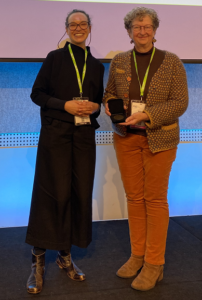
VALA President Melissa Parent presenting the 2022 Williamson Award medallion to Anne Stevenson
Anne commenced work at CSIRO in 1979 and throughout her 43 year career as a Librarian she has made an outstanding, unique contribution to information management across CSIRO and the profession. Anne’s work is key to the realisation of the highest possible value for CSIRO’s data assets, enabling their reuse and proliferation amongst a cohort of international researchers, thus achieving maximum impact for Australian science. Anne’s work is centred around the development of bespoke software that supports world-class information management at CSIRO and the provision of training and support for this software to increase its utility. In her current role, she leads a team of Data Librarians whose work fostering a strong data culture and research data management skills are at the forefront of industry standard.
Research Data Management is a relatively new specialisation within the library profession. Anne has an innate understanding of her role as a librarian, industry trends and information management tools which she has leveraged to forge a path for herself and her peers in this domain.
Anne is a respected go-to for advice within CSIRO. She is the acknowledged “guru” and all round sounding board for all of the innovative ideas and new initiatives within the Library service. We all depend on her and turn to her to support the innovative, the creative and the leading edge services that we want to promote and provide. Her advice and enthusiasm has been an inspiration and a great impetus for getting new projects not only off the ground, but well on their way to being supported and completed. Anne has exceptional domain specific knowledge and is consulted for large-scale, multidisciplinary projects within CSIRO.
Key examples of her contribution to project work include:
• Research Data Planner: Phase 3 : The Research Data Planner is a tool for gathering requirements and documenting decisions on how research data is managed throughout a project. Anne was involved in the third phase of development of this online tool, participating in feature request prioritisation, help text reviews, question syntax reviews creating design mock-ups for changes to functionality, and user acceptance testing.
• CMS: Specify Implementation : National Research Collections Australia (NRCA) encompasses 15+ million specimens documenting Australia’s rich biodiversity housed across multiple collections, all with their own data management system and metadata standards. NRCA is investigating how we can manage these collections centrally and Anne has provided key advice on required metadata to support this implementation. She has been involved extensively with this project, developing cross-walks between systems to establish a common set of descriptors.
• ePublish Anne has always been active in the publications space at CSIRO, looking at opportunities and assisting with developing solutions. Her involvement led to her being invited to be part of the project team that designed a publications approval system and the creation of a single enterprise repository which the approvals system was to feed. Her involvement in the ePublish project is addressed in greater detail in the ‘Innovation’ section.
Excellence is also evident in Anne’s operational work, examples of which include:
• Anne and her team deliver workshops and training at CSIRO for the organisation’s bespoke information management platforms, the Data Access Portal and the Research Data Planner. Anne’s passion for providing quality support to researchers is unparalleled, which is reflected in the quality of service that she and her team deliver.
• Anne raises awareness for Research Data Management and promotes this practice across the organisation hosting webinars, leading awareness activities and supporting the development of company on-demand training modules for Research Data Management. She is well-known as a metadata and citation expert and she provides advice to colleagues on best practice standards for these concepts.
Anne’s excellence and pride in her work is evident in all that she does. Anne has documented her extensive experience and knowledge for the benefit of the profession and has contributed to 13 publications, which include peer-reviewed conference papers and journal articles. For the full list of Anne’s publications, please see Anne’s ORCiD profile https://orcid.org/0000-0001-8543-2133
Anne is active in the national and international information and data communities and plays a strong leadership role within CSIRO supporting researchers, research leaders and publications officers; as well as acting as a subject matter expert for system and process development in the organisation.
Professional memberships include:
•Member 2012 – ongoing: Standards Australia IT-019: Information and Communications Technology Services – Learning, Education, Training and Research
•Member 2011 – ongoing: RIF-CS Advisory Board https://www.ands.org.au/partners-and-communities/ands-communities/rif-cs-advisory-board .
•Member & Peer-review: eResearch Australasia Conference Committee, 2019 edition https://conference.eresearch.edu.au/eresearch-australasia-conference-2019-home/.
Anne promotes best standards of practice for Research Data Management and Open Access Publishing. Examples of her engagement include:
• Strong support for Information Awareness Week, a CSIRO internal program and encourages her team to do the same. In 2021, Anne delivered a series of Data Clinics on the Research Data Planner with a colleague.
• The contribution of conference presentations and papers, including: Stevenson, Anne; Cronje, Carmi. Answering the call: researcher-driven training in data management. In: Open Repositories 2019; June 10-13, 2019; Hamburg, Germany. The 14th Annual Conference on Open Repositories; 2019. 11 p.. http://hdl.handle.net/102.100.100/179726?index=1
• CSIRO has regularly been a national sponsor for GovHack https://govhack.org/. Anne was part of the team that coordinated CSIROs involvement in the 2019 and 2020 editions of the event, posing several challenges to the nation.
• Thrive or survive – how can we adapt for the future; Australia@Sea – what is our future relationship with the ocean environment. The event was a huge success with over 60+ entries received. https://blog.csiro.au/one-hack-of-a-weekend/
• Data-driven decisions for improved disaster planning, management or recovery; Track and trace – help end plastic waste. More than 1000 people attended a digital version of GovHack, with 691 keen hackers in their midst. https://blog.csiro.au/govhack-2020/
Anne invests personally in the professional development of her team, her peers and herself. She leads by example through her engagement with new tools and concepts, transforming this knowledge into opportunities for her team, CSIRO and the profession. Anne is very generous with her time and shares her knowledge freely. She is an emotionally intelligent leader; throughout her career, she has drawn on her empathy, calm attitude and kindness to get results and to arrive at mutually beneficial compromise for all stakeholders.

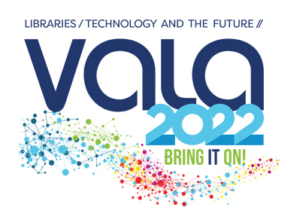
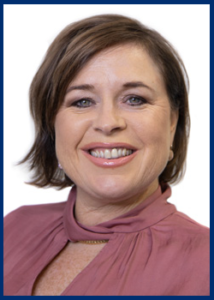 Veronica Steinicke is passionate about helping customer focused organisations enhance their service offering through technology. With over 20 years’ experience providing solutions to customers Veronica enjoys and values her many long term customer relationships. She now proudly leads Intelligent RFID Solutions as the Chief Executive Officer.
Veronica Steinicke is passionate about helping customer focused organisations enhance their service offering through technology. With over 20 years’ experience providing solutions to customers Veronica enjoys and values her many long term customer relationships. She now proudly leads Intelligent RFID Solutions as the Chief Executive Officer.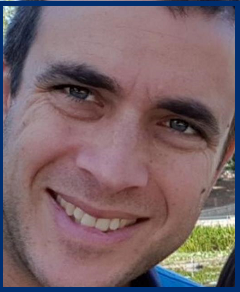 Daniel Greenberg is the Product manager of Alma Digital and Rosetta, Ex Libris’ digital asset management solutions for libraries, archives, special collections and more. Responsible for positioning Ex Libris as a lead player in the latest digital trends at libraries, resulting in an industry-focused and innovative roadmap. Previous experience includes many years of developing SaaS and on-premise software solutions.
Daniel Greenberg is the Product manager of Alma Digital and Rosetta, Ex Libris’ digital asset management solutions for libraries, archives, special collections and more. Responsible for positioning Ex Libris as a lead player in the latest digital trends at libraries, resulting in an industry-focused and innovative roadmap. Previous experience includes many years of developing SaaS and on-premise software solutions.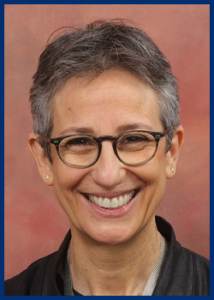 With a degree in computer science and mathematics, Tamar Sadeh began her career developing search engines for structured and unstructured data. At Ex Libris, a ProQuest company, Tamar has taken an active role in the definition and marketing of the company’s various technologies since she joined in 1999. In the past few years, she has been leading the Company’s initiatives around teaching and learning. Tamar holds a doctorate from City University London’s School of Informatics. In parallel to her work at Ex Libris, Tamar is a narrator for audiobooks at the Central Library for the Blind.
With a degree in computer science and mathematics, Tamar Sadeh began her career developing search engines for structured and unstructured data. At Ex Libris, a ProQuest company, Tamar has taken an active role in the definition and marketing of the company’s various technologies since she joined in 1999. In the past few years, she has been leading the Company’s initiatives around teaching and learning. Tamar holds a doctorate from City University London’s School of Informatics. In parallel to her work at Ex Libris, Tamar is a narrator for audiobooks at the Central Library for the Blind. As the Training Executive for Gale, Damian Almeida is responsible for assisting Gale’s customers with any training that is required on the Gale product line. Damian is also responsible for The Gale Digital Scholar Lab in the ANZ region.
As the Training Executive for Gale, Damian Almeida is responsible for assisting Gale’s customers with any training that is required on the Gale product line. Damian is also responsible for The Gale Digital Scholar Lab in the ANZ region. Andrea Lopez is the Director of Sales, Partnerships & Initiatives at Annual Reviews. She has over 30 years of experience in academic publishing sales, 22 of those in STM publishing. Since the inception of the Site License program at Annual Reviews in 1999, she has been responsible for the sales and distribution of Annual Reviews, and most recently for the implementation of the Subscribe to Open Pilot. She is a founding member of the Subscribe to Open Community of Practice.
Andrea Lopez is the Director of Sales, Partnerships & Initiatives at Annual Reviews. She has over 30 years of experience in academic publishing sales, 22 of those in STM publishing. Since the inception of the Site License program at Annual Reviews in 1999, she has been responsible for the sales and distribution of Annual Reviews, and most recently for the implementation of the Subscribe to Open Pilot. She is a founding member of the Subscribe to Open Community of Practice.